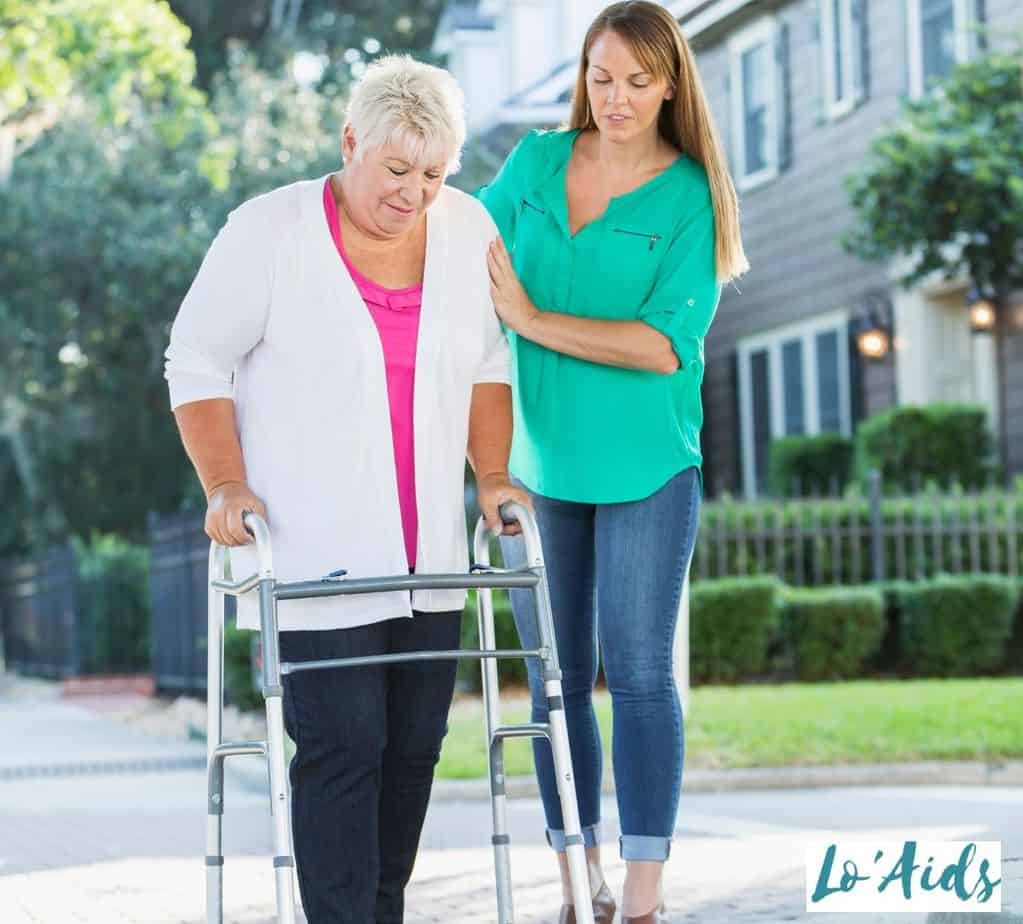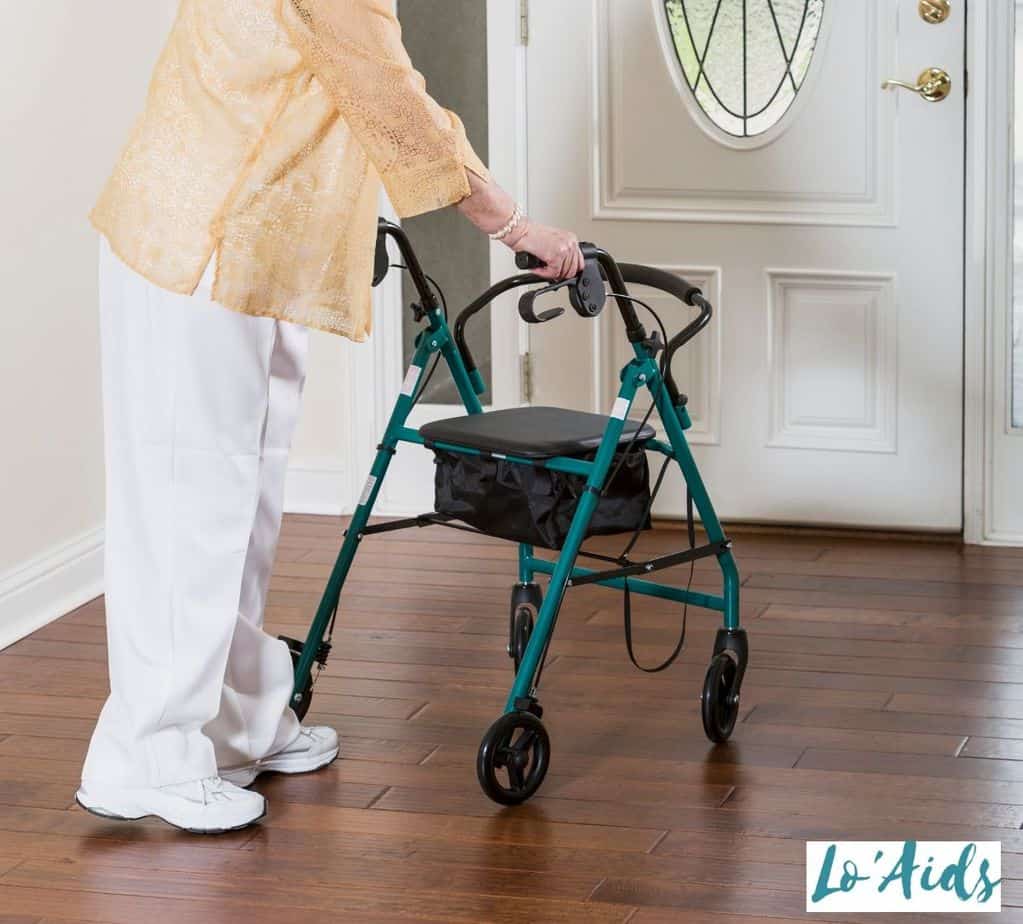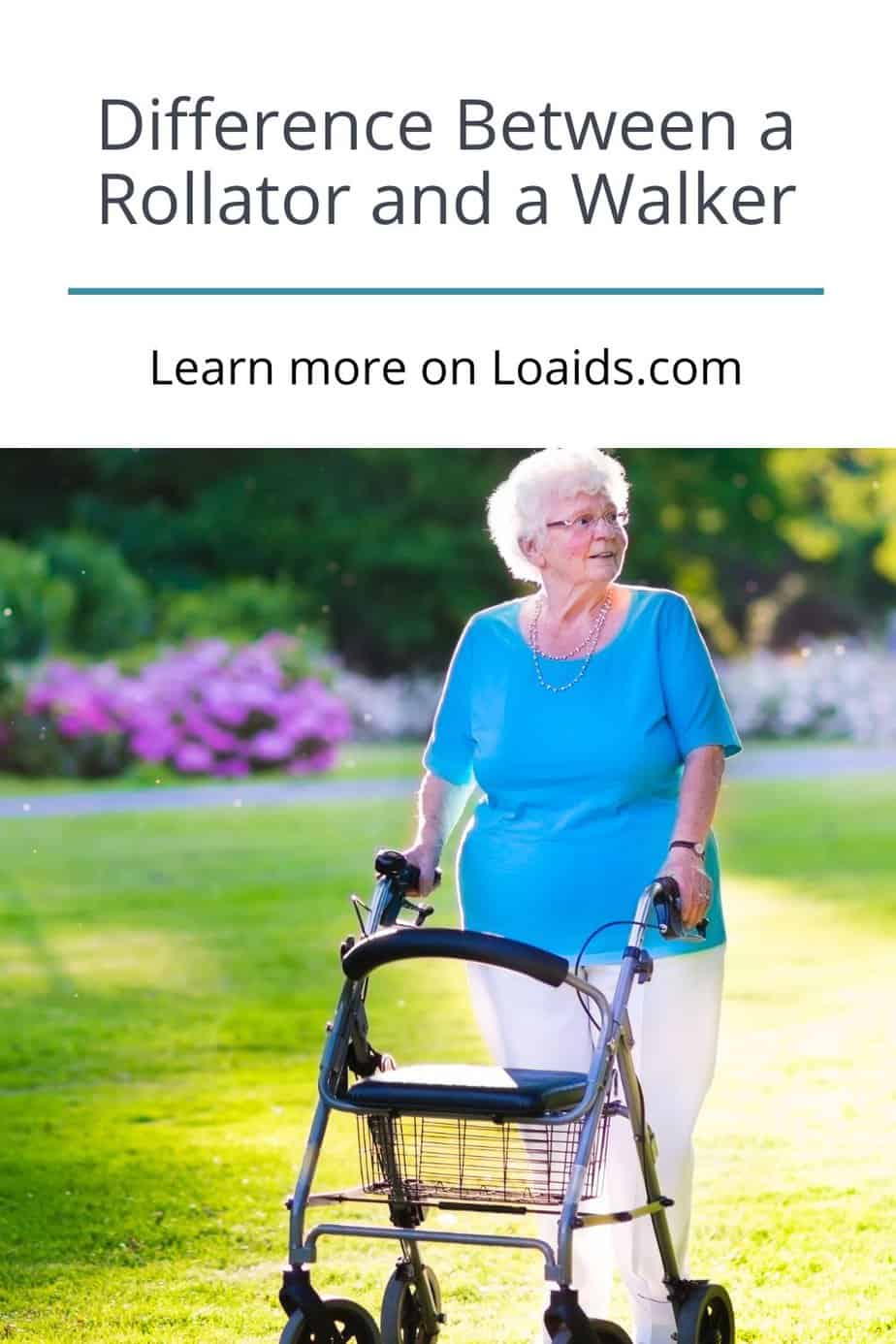Before jumping into the walker vs rollator debate, did you know that nearly 25 million American faces some mobility challenges? (1)
If you or a loved one needs assistance, you are probably wondering which mobility aid will be best.
If you’re trying to decide whether it’s a rollator or a standard walker you should go for, you are just at the right place!
After research and speaking to experts, I creating this detailed guide to both options, so let’s take a look.
CHECK: Stand Up Walker Reviews
Table of Contents
What is a Rollator Walker?
A Rollator Walker is a wheeled mobility device usually for people who have mobility issues but can still support their body weight well (2).

Also known as a rolling walker, it is literally like an advanced version of a standard walker because it offers more convenience during use.
They also often come with a seat. Check out the best rollator walker with seat 2022 to take a closure look.
You don’t always have to lift the frame as you take each step. You can simply push the rollator on its wheels. My grandmother had one of these and found it easier to use than a regular walker.
Depending on what you prefer, you can have a three-wheeled rollator or a four-wheeled rollator. Most people prefer the three-wheeled rollator but the padded seat featured in the four-wheeled version gives it an edge!
Initially, you might worry that the wheels make the walker harder to control and less stable. However, rollators have handlebars which also include hand brakes making their wheel control easy.
This walking aid is a heavy-duty device due to the presence of the brake system and wheels. Because of this, you should ensure that your arm strength can handle this device before acquiring one.
A rollator walker is available in a wide variety of colors and different heights including tall, standard, hemi, and junior. Some models also feature a cup holder as well as a shopping pouch or basket for keeping personal items.
If you choose this style of walker, you will need to adjust to using it. How to use a walker with wheels will help you with the process.
Now let’s take a look at standard walkers.
READ MORE: Does Using a Walker Help With Back Pain?
What is a Standard Walker?

A standard walker is a stable mobility solution for people who can still support themselves on their feet comfortably but can no longer walk long distances on their own.
Although this type of walking aid provides plenty of support, it requires you to lift it with each step that you take. Lifting this device would require the user to have enough upper body strength.
Adequate arm strength is another factor to consider when choosing a standard walker.
A standard walker, also known as a traditional walker, is made of a metal frame standing on four legs with central support bars.
This upright walker is not as sophisticated as a rollator walker and is relatively lightweight. It is often lighter than a rollator, which some users will find using more comfortable.
Standard walkers can be wheeled or non-wheeled. The wheeled version is usually a two-wheeled walker and is easier and more maneuverable to move around.
Before getting a rollator, my grandmother had a basic walker with no wheels. She got on fine with it but much prefers wheels. However, everyone is different in their preferences and ability.
So it is a good idea to test both kinds before committing to a specific one. Hopefully, this guide will help you on that journey.
Standard walkers do not have padded seats although you can fit them with accessories if you want. You can add a cup holder, trays, or baskets for storing items.
Some models of standard walkers are foldable and are usually designed with one or two buttons to activate the fold. They are also height adjustable.
So what are all the differences between them? Keep reading to find out.
READ MORE: Can You Use a Rollator as a Wheelchair?
What is the Difference Between a Rollator and a Walker?
The main difference between a rollator and a walker is that a rollator can be pushed about easily on its wheels while a walker requires you to lift the frame each time you take a step.
In the table below, it’s a head-to-head contest. Walker vs rollator!
| Rollator | Standard Walker |
| Also called rolling walkers | Also known as a medical walker or traditional walker |
| Can either be three or four-wheeled | Can only be two-wheeled at most |
| Heavy-duty; includes a padded seat, handlebars, cup or beverage holder, basket or pouch, cane holder | Simpler and lightweight; includes foam handle, basket, or tray (optional), lacks built-in seat |
| Costs between $70-$600 depending on model | Costs between $50-$250 |
| Available in different height sizes | Foldable and of adjustable height |
| Walking speed can be faster (based on rolling wheels) | Walking speed is dependent on the user |
Find out more about different types of walkers for seniors.
Wheels
Standard walkers can either be wheeled or non-wheeled, and when wheeled, they are usually two-wheeled. Rollators on the other hand are always wheeled.
They can either be three-wheeled or four-wheeled.
Height
Standard walkers are usually of adjustable height and there’s usually a button or two designed into them for this purpose.
Rollators are of fixed height but are available in different sizes.
Weight
A standard walker (also known as a medical walker) is relatively lightweight. A rollator has a greater degree of sophistication due to the presence of wheels, handlebars, and padded seats giving it a heavy-duty frame and more weight.
Padded seat
Standard walkers do not feature padded seats while rollators may or may not feature padded seats depending on the model.
You can watch this video to better understand how to differentiate between a walker and a rollator:
Now that you know the differences, which walker should you use? Let’s take a look.
Should I Use Standard Walker or a Rollator?
You can either use a standard walker or a rollator depending on certain factors. Some of the factors to consider when making a choice in the standard walker vs rolling walker debate are:
#1 Your upper body strength
A Standard Walker will require greater upper body strength
#2 Your Stability and balance
Those with stability and balance issues should not consider a rollator.
#3 Storage and transport
If you travel often, you might want to consider a standard walker as it is foldable and can be easily transported with you and stored.
#4 Your Budget
Rollators cost more than standard walkers.

A rollator is considered more appropriate for those who do not have poor balance and stability. Also, if you get weakness from standing a standard walker is probably a better option.
Mobility issues are prevalent in older adults, thus a rollator is also recommended for the aged as it features a comfortable seat for resting (3).
How long a person with mobility issues can walk without requiring an aid is another determining factor. If for example, you can not walk without aid from the bedroom to the bathroom, then you should go for a walker instead.
Regardless of which type of walker you choose, studies have found the benefits of using mobility devices include improved confidence and feelings of safety (4).
FAQs
Do rollators prevent falls?

Rollators are an effective aid for preventing the frequency of falls experienced by those with mobility issues.
However, they can also cause an increase in the frequency of falls if you go for a model with a weight that is incompatible with your body strength.
Is a rollator better than a cane?
A rollator is better than a cane as it offers more support and a comfortable seat. However, people with mobility issues due to a weakness or pain on one side of the body may find a cane better.
Which type of walker is referred to as a rollator?
The type of walker referred to as a rollator is one with has three or four wheels and often comes with a padded seat.
Conclusion
Standard walkers and rollators have proven to be effective in reducing the risk of falls and resultant injuries that people with walking issues have.
As you make your choice between a traditional walker and a rolling walker, remember to consider the factors listed above, especially upper body strength and walking steadiness/balance.
As I draw the line to the walker vs rollator debate here, I hope it’s now easier to make your choice after reading this article.

Do you have experience with one of both types of walkers? How did you find them and do you have a preference? Let me know in the comments.
Resources
- 1. FastStats – Disabilities or Limitations [Internet]. 2019. Available from: https://www.cdc.gov/nchs/fastats/disability.htm
- 2. Mundt M, Batista JP, Markert B, Bollheimer C, Laurentius T. Walking with rollator: a systematic review of gait parameters in older persons. European Review of Aging and Physical Activity. 2019;16.
- 3. Webber SC, Porter MM, Menec VH. Mobility in Older Adults: A Comprehensive Framework. The Gerontologist [Internet]. 2010;50:443–50. Available from: https://academic.oup.com/gerontologist/article/50/4/443/743504
- 4. A comparison of mobility assistive devices for elderly and patients with lower limb injury: Narrative Review [Internet]. Researchgate. 2020 [cited 2022 Aug 3]. Available from: https://www.researchgate.net/profile/Paroma-Arefin/publication/341463954_A_comparison_of_mobility_assistive_devices_for_elderly_and_patients_with_lower_limb_injury_Narrative_Review/links/5ed4d923299bf1c67d322934/A-comparison-of-mobility-assistive-devices-for-elderly-and-patients-with-lower-limb-injury-Narrative-Review.pdf








My Dad had a rolling walker because he didn’t like the standard one.
I hadn’t heard of a rollator before. I can see how it would come in handy and be preferred over walkers.
First of all thanks for this article, with this, a misconception about this two will be solved. In the end, it’s really the patient’s decision on what to use between this two. Thanks for sharing this with us, it’s very informative!
I used a walker after I had back surgery. It was a pain to use and if I had to use it full time, I would opt for the rollator. Not only would it move easier it offers a seat as well.
I didn’t realize there were so many options available for mobility issues!
Its so important to understand how these work and which ones are best for you.
I wasn’t particularly familiar with the differences between these two. It is good to know what works best for different things.
I like the rollator walker. My mom used her wheelchair to walk and it always made me so nervous that she was going to slip (and she had a walker). Stubborn, beautiful woman.
I didn’t know the difference between these two. I think the choice dipends on the specific needs of the person.
Thank you for sharing this with us. I had no idea the difference between the two.